BR Standard Class 4 2-6-4T
The British Railways Standard Class 4 tank is a class of steam locomotive, one of the BR standard classes built during the 1950s. They were used primarily on commuter and outer suburban services.
| BR standard class 4 tank | |||||||||||||||||||||||||||||||||||||||||||||||||||||
|---|---|---|---|---|---|---|---|---|---|---|---|---|---|---|---|---|---|---|---|---|---|---|---|---|---|---|---|---|---|---|---|---|---|---|---|---|---|---|---|---|---|---|---|---|---|---|---|---|---|---|---|---|---|
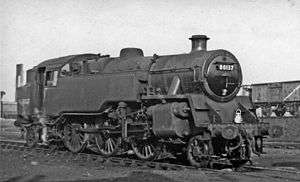 80137 at Neasden MPD in March 1957. | |||||||||||||||||||||||||||||||||||||||||||||||||||||
| |||||||||||||||||||||||||||||||||||||||||||||||||||||
| |||||||||||||||||||||||||||||||||||||||||||||||||||||
| |||||||||||||||||||||||||||||||||||||||||||||||||||||
| |||||||||||||||||||||||||||||||||||||||||||||||||||||
Background
On the nationalisation of British Railways (BR) in 1948, the London Midland Region had a number of ex-London, Midland and Scottish Railway 2-6-4T and the Western Region a number of GWR Large Prairie 2-6-2T types. These tank engines were particularly suited to commuter and secondary services. However, particularly in Scotland and the Southern Region, the situation was not so good, with large numbers of pre-grouping types struggling on.
Design and construction
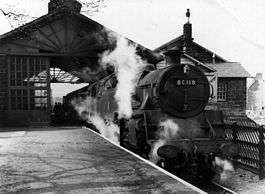
On the decision to build the BR standard series of locomotives, a series of class four tank engines was ordered, based on the ex-LMS Fairburn 2-6-4T with some modifications. The lineage of the class could therefore be tracked through the LMS/BR Class 4 2-6-4T locomotives back to the Fowler design of 1927.
Design work was done at Brighton, the overall programme being overseen by R.A. Riddles. The principal modifications to the Fairburn design involved the reduction of their envelope to enable them to fit into the L1 loading gauge. To do this, the tanks and cab were made more curved than the Fairburn design, the Fairburn having a straight-sided tank. The biggest mechanical change was a reduction in cylinder size, also to reduce cross-section, and a corresponding increase in boiler pressure to compensate. Other visible changes included the re-introduction of plating ahead of the cylinders.
130 of the class of 155 were built at Brighton, 15 (80000–80009, 80054–80058) at Derby Works and 10 (80106–80115) at Doncaster Works between 1951 and 1956. The first to emerge was 80010 from Brighton in 1951. Fifteen that were due to be constructed in 1957 were cancelled, due to impending dieselisation, and the last five would have been, too, had they not been at an advanced stage of construction when the order came to cancel them.
No significant modifications were made to the design. The tank vent was found to restrict the driver's vision and was moved further forward from 80059 onwards. Initially built with fluted coupling rods, these caused problems on other classes and, from 80079, plain section coupling rods were substituted.
The BR standard class 4 4-6-0 was essentially a tender engine derivative of the Standard Class 4 tank.
Service
The Standard 4 tanks were originally allocated to all regions of British Railways, bar the Western. They became particularly associated with the London, Tilbury and Southend Line (LT&S) working commuter services out of London, until that route was electrified in 1962. They were also widely used in East Sussex and Kent, working from Brighton, Tunbridge Wells and Three Bridges on those lines of the former London Brighton and South Coast Railway that were not electrified. Another group worked from Polmadie depot in the Scottish region on the Glasgow commuter services. Note that, from July 1962, a batch displaced by electrification of the LT&S was transferred to the Western Region's Swansea (East Dock) and Shrewsbury districts, as well as other regions.
Accidents and incidents
- On 24 April 1956, Locomotive No. 80119 was derailed at Scalby, Yorkshire when the track spread under it whilst shunting. An instruction banning heavy locomotives from shunting at Scalby had been forgotten.[1]
- On 30 January 1958, locomotive No. 80079 was hauling a passenger train that overran signals and was in a rear-end collision with another passenger train at Dagenham, Essex. Ten people were killed and 89 were injured.
- On 18 April 1961, locomotive No. 80075 was hauling a passenger train that was derailed at Pitsea, Essex due to a pointsman's error during single line working.[2]
- On 9 December 1962, locomotive No. 80102 was derailed at Gosport, Hampshire due to vandalism.[3]
Withdrawal
There was a mass withdrawal of steam locomotive classes in the 1960s. Older types were withdrawn in preference to the Standard 4s, which class remained intact until 1964 (except for 80103 as noted below). The final nine were withdrawn from the Southern Region on 9 July 1967. One Scottish Region example, 80002, remained in Glasgow past the end of steam haulage until 1969 as a static carriage heating boiler.
No. 80103 was withdrawn in 1962 after being reported for rough riding. It was towed between two other locomotives to Stratford Works, where it was discovered that the mainframe was broken in half. Considered beyond economic repair, 80103 was withdrawn and scrapped. It was the first of the 'Standard' locomotives to be withdrawn, and the only one scrapped at Stratford.
| Year | Quantity in service at start of year | Quantity withdrawn | Locomotive numbers | Notes |
|---|---|---|---|---|
| 1962 | 155 | 1 | 80103 | |
| 1964 | 154 | 31 | 80008–10/17/21/30–31/36/38/40/44/49–50/52–53/56/62/71/73–77/87, 80106–07/15/25/27/29/48. | |
| 1965 | 123 | 42 | 80003/14/18/20/22–23/29/35/42/48/64/66–67/70/72/78–81/84/88/90/97–99, 80100–02/04–05/08–10/19/31/35–37/47/49–50/53. | |
| 1966 | 81 | 56 | 80000–01/05–07/13/24–28/33–34/37/39/41/43/47/51/54–55/57–61/63/65/68–69/82–83/89/91–96, 80111–14/17–18/21–24/26/30/32/38/41–42/44. | |
| 1967 | 25 | 25 | 80002/04/11–12/15–16/19/32/45–46/85–86, 80116/20/28/33–34/39–40/43/45–46/51–52/54. | |
Operation in preservation
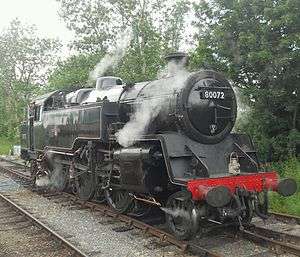
Of the fifteen engines to survive into preservation, only one was purchased directly from BR and this was No. 80002, all the others being purchased from Barry Scrapyard. Of the fifteen engines to be preserved only two members of the class are yet to run in preservation, these being: 80100 and 80150. 80097 has recently been steamed in preservation and entered service in March 2019 following its restoration from scrapyard condition at the East Lancashire Railway.[4] Five of them have also seen mainline operation: Nos. 80002, 80079, 80080, 80098 and 80135. 80002 operated over the former BR system in the 1970s when it appeared at an open weekend in Leeds arriving and returning home from the event under its own power. Three of the class were regular mainline performers around the '90s, with 80080 being originally used on LU 'Steam on the Met' trips. In 1991, steam was to return to the Folkestone Harbour branch with 80080 taking the train down from the mainline to the station at Folkestone Harbour and then for the journey back up to the mainline 80080 was used to bank West Country Pacific No. 34027 Taw Valley.
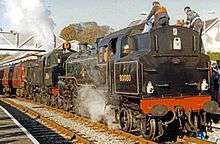
80080 became the first steam locomotive to work a normal stopping passenger service on the mainline in March 1993. It also returned to the Cambrian network in 1992. In 1994, 80079 joined up with 80080 to work a number of steam specials including a run over the Cambrian Coast Line.
In 1998, 80079 became the first steam locomotive to work a steam special down the Conwy Valley Line to Blaenau Ffestiniog since 1967.
80079 returned to Blaenau in 1999 with 80098.
80135 has been used on the Grosmont to Whitby workings for the North Yorkshire Moors Railway on the Esk Valley Line
Locomotives
No fewer than fifteen Standard Four tanks have survived the cutter's torch.
All but one member of the class in preservation were built at Brighton Works with 80002 being built at Derby Works.
| Number | Builder | Built | Withdrawn | Service life | Location | Livery | Status | Image |
|---|---|---|---|---|---|---|---|---|
| 80002 | Derby Works | Nov 1952 | March 1967 | 14 years, 4 months | Keighley and Worth Valley Railway | BR Lined Black, Early Emblem | Awaiting overhaul. Boiler certificate expired in August 2013. | 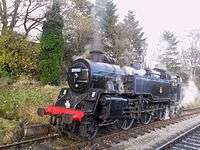 |
| 80064 | Brighton Works | June 1953 | Sep 1965 | 12 years, 3 months | Bluebell Railway | BR Lined Black, Early Emblem | Awaiting major overhaul. Boiler certificate expired in 1991.[5] | 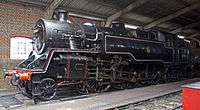 |
| 80072 | Brighton Works | Nov 1953 | July 1965 | 11 years, 8 months | Llangollen Railway | BR Lined Black, Late Emblem | Awaiting overhaul. Boiler ticket expired in 2019. | 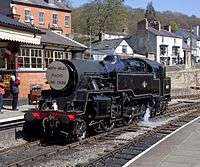 |
| 80078 | Brighton Works | Feb 1954 | July 1965 | 11 years, 5 months | Privately Owned, currently operational at Mid Norfolk Railway. | BR Lined Black, Early Emblem | Operational. Returned to service May 2017, based in Essex and visits other heritage railways throughout the year. | 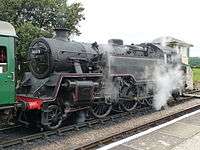 |
| 80079 | Brighton Works | March 1954 | July 1965 | 11 years, 4 months | Severn Valley Railway | BR Lined Black, Late Emblem | Restored. Cosmetically restored in The Engine House. | .jpg) |
| 80080 | Brighton Works | March 1954 | July 1965 | 11 years, 4 months | Midland Railway - Butterley | BR Lined Black, Late Emblem | Operational at the East Lancashire Railway. | .jpg) |
| 80097 | Brighton Works | Dec 1954 | July 1965 | 10 years, 7 months | East Lancashire Railway | BR Lined Black, Early Emblem | Restoration from scrapyard condition completed in January 2019. | .jpg) |
| 80098 | Brighton Works | Dec 1954 | July 1965 | 10 years, 7 months | Midland Railway - Butterley | BR Lined Black, Late Emblem | Undergoing overhaul. | .jpg) |
| 80100 | Brighton Works | Jan 1955 | July 1965 | 10 years, 6 months | Bluebell Railway | N/A | Awaiting restoration from ex-Barry condition. | 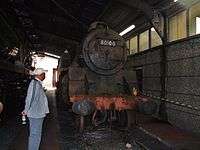 |
| 80104 | Brighton Works | March 1955 | July 1965 | 10 years, 4 months | Swanage Railway | BR Lined Black, Late Emblem | Operational, boiler ticket expires in 2021. | 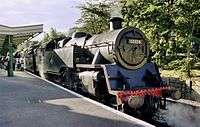 |
| 80105 | Brighton Works | April 1955 | July 1965 | 10 years, 3 months | Bo'ness and Kinneil Railway | BR Lined Black, Early Emblem | Under overhaul, Boiler certificate expired 2010. Undergoing major 4-year overhaul. | 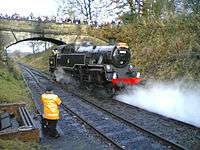 |
| 80135 | Brighton Works | April 1956 | July 1965 | 9 years, 3 months | North Yorkshire Moors Railway | BR Lined Green, Late Emblem | Currently under overhaul. 80135 is the only 4MT to carry lined BR Brunswick Green, a livery not carried by any 4MT's in BR service. Will be fitted with TWPS for main line use between Pickering and Whitby when finished. | 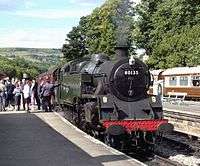 |
| 80136 | Brighton Works | May 1956 | July 1965 | 9 years, 2 months | North Yorkshire Moors Railway | BR Lined Black, Early Emblem | Resteamed in late July 2016 after a complete overhaul, mostly at Crewe but finished at Grosmont. |  |
| 80150 | Brighton Works | Dec 1956 | Nov 1965 | 8 years, 11 months | Mid Hants Railway | Unlined Black | Awaiting restoration from Barry scrapyard condition. Swapped to the MHR by the Vale of Glamorgan District Council in exchange for the ex-Bricklayers Arms turntable. | 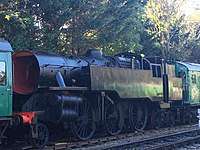 |
| 80151 | Brighton Works | Jan 1957 | June 1967 | 10 years, 5 months | Bluebell Railway | BR Lined Black, Late Emblem | Operational, boiler ticket expires in 2029. |  |
In fiction
Belle, a character from Thomas & Friends, is loosely based on this engine. The difference is that she has water cannons on top of her tanks (which was clearly an idea by the series producer) and a big brass steam locomotive bell (in real life, only American steam locomotives have a brass bell.).[6]
References
- Hoole, Ken (1983). Trains in Trouble: Vol. 4. Redruth: Atlantic Books. p. 32. ISBN 0 906899 07 9.
- Hoole, Ken (1982). Trains in Trouble: Vol. 3. Redruth: Atlantic Books. p. 45. ISBN 0-906899-05-2.
- Bishop, Bill (1984). Off the Rails. Southampton: Kingfisher. p. 85. ISBN 0 946184 06 2.
- http://www.burystandard4group.org.uk/news/workshop-update-5th-october-2018 80097 under final assembly
- "Bluebell Railway - Locomotives on Static Display". www.bluebell-railway.co.uk.
- "Archived copy". Archived from the original on 30 June 2017. Retrieved 25 January 2017.CS1 maint: archived copy as title (link)
Sources
- Bradley, Rodger P. (1984). The Standard Steam Locomotives of British Railways. David & Charles. ISBN 0715383841.
- Chancellor, Paul J. (December 1997). Taylor, R. K. (ed.). A Detailed History of British Railways Standard Steam Locomotives: vol 3 Tank Engine Classes. Railway Correspondence and Travel Society (RCTS). ISBN 0-901115-77-0.